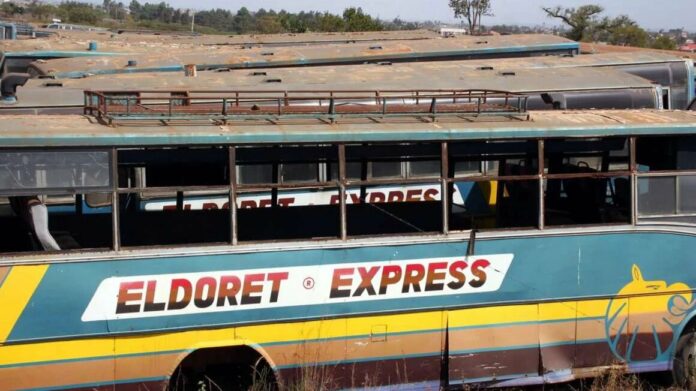The Eldoret Express was once the most famous and most prestigious public service fleet. If you traveling from Nairobi to Nyanza or Rift Valley, you had to use the Eldoret Express. This is the fleet that brought the end of buses such as Akamba and Matunda.
Today, though, the dozens of Eldoret Express buses lying at various yards tell a story of the pain of transport businesses in Kenya. One such yard is located in Juja, Kiambu County.
Here, the Scania machines are parked too close to the other to fill the 450-metre perimeter field, and penetrating through is almost impossible.
Broken window panes, rims with no tyres, worn out seats, old registration plates, dust and cobwebs are the common denominators here.
They are testament of the time the vehicles have laid here, and also some assurance that they will never go back to the road. It is a graveyard for buses.
Kilunda: I moved to the village, opened salon business instead of begging
But even in their seemingly helpless state, the bus company’s management is overprotective and tightly guards them from any uninvited persons’ access.
“If my boss knew I had allowed you in, he would think I am selling you scrap metal. I would be in trouble,” the watchman at the Juja yard said.
And Juja is not the only facility where the company is holding the over 100 buses that have become worthless, although the management is hesitant to disclose the other locations.
The management, however, confirmed that it disposed of the vehicles after it became uneconomical to continue operating them, having been on the road for years.
“After functioning for some years, public service vehicles become uneconomical to operate. We dispose of about six vehicles every year,” said Mr Joseph Nganga, the operations manager at the company. To understand the situation better, we ran searches through Google Earth — a site that captures aerial images of places across the globe.
The images showed there were 56 buses occupying a 275m perimeter field (4,664 square-meter area) at Juja yard the last time the site was updated.
At the company’s farm in Kiungani, Kitale in Trans Nzoia County, about 80 buses littered the 500-metre perimeter compound (an area of some 14,000 square meters), at the time.
They are scattered all over the expansive farm, creating the view of some sort of an estate of many houses from above.
The Eldoret Express company tries to maintain an upright posture, claiming to be matching on strongly. But it is clear that the once formidable empire in long distance road travel is headed to its knees.
The company’s death is attributed to the dynamic changes in the transport industry. It was reported that the Eldoret Express was unable to keep up with the introduction of long distance matatus (shuttles) leading to their irrelevance in the sector. Majority of the commuters chose to board shuttles for long distances over buses which are considered relatively slower. The management of the company delayed in adjusting to the new developments leading to their slow death.
The operations manager confirmed the rumours that the company is under financial crisis and operating in debt but affirmed that the current debts are manageable.








